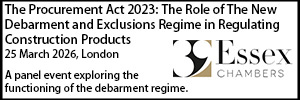Procurements and losses suffered by group companies
- Details
A High Court judge earlier this month lifted an automatic suspension that was preventing the Home Office from entering into contracts worth more than £750m for visa and citizenship application services. Ed Williams and Nico Tilche look at the lessons to be learned.
In Teleperformance Contact Limited v Secretary of State for the Home Department and VF Worldwide Holdings Ltd [2023] EWHC 2481 (TCC), a judgment that is likely to be of importance to private sector suppliers operating via corporate groups, the Judge clarifies the circumstances in which losses suffered by group companies (as opposed to the bidding entity itself) can be taken into consideration when assessing whether a Claimant in procurement cases could be adequately compensated by an award of damages. It also highlights the important role Interested Parties can play in applications of this nature.
Key legal issue
When determining whether or not to lift the automatic suspension, one of the key issues to be resolved is whether or not damages would be an adequate remedy for the Claimant if the suspension were to be lifted and the Defendant were to proceed to award the relevant contract to the successful tenderer. If the Court concludes that damages would be an adequate remedy, that is usually the end of the matter and the Court will likely lift the suspension.
The key legal issue in dispute in this case was whether the Court is entitled to take into account losses incurred by other entities within the Claimant's wider corporate group when assessing whether damages would be an adequate remedy for the Claimant.
The Judge held that it would not be appropriate to take losses suffered by the Claimant's wider group into account when determining whether damages would be an adequate remedy for the Claimant. The general principle is that it is only the losses of the Claimant itself that are relevant. In this case, there was no special nexus between any losses suffered by the relevant group companies and intangible and reputational losses suffered by the Claimant which meant that the general principle should be displaced. There was no evidence, for example, that the Claimant itself was facing an existential threat as a result of losses to its other group companies (or otherwise).
The Judge went on to find that even if the losses of the Claimant's group companies could be taken into account, the evidence before the Court did not support the Claimant's arguments that lifting the suspension would result in far-reaching harm and prejudice to the wider corporate group such that damages would not be an adequate remedy. In reaching this conclusion, the Judge noted that the Claimant's evidence was vague, imprecise, was not supported by appropriate documentary evidence and, in large part, was effectively rebutted by the detailed evidence adduced by the Interested Party.
Comment
This judgment will be important for entities that operate or bid for public contracts via SPVs or as part of a wider corporate group:
- The judgment clarifies that when the Claimant is an SPV, it is highly unlikely that a Court will take into account losses suffered by the parent company or other entities in determining whether damages are an adequate remedy for the purposes of an application to lift the automatic suspension. This could make it very difficult for such bidders to force awarding authorities to maintain the suspension pending trial of their substantive claims.
- In light of the above, as well as other recent cases that have confirmed that only bidding entities will have standing to recover damages under the PCR, suppliers to the UK public sector should give careful consideration to the entity used to bid for particular contracts and where it sits within their corporate groups. As stated in the judgment, the use of SPVs to bid for such contracts may carry certain advantages, but it will also come with the disadvantage of making it potentially difficult to maintain the suspension in the event that it wishes to challenge the outcome of the procurement.
- One potential way to avoid the potentially harsh consequence of this judgment would be for both parent company and SPV to challenge the outcome of the relevant procurement. The possibility of parent companies having standing to bring claims under the PCR in respect of procurements in which SPVs have participated has been expressly left open. Until that issue has been determined, the possibility of claims by both parent companies and SPVs remains a potential solution.
- In respect of the Claimant's evidence that its group could suffer significant redundancies if the suspension was lifted, the Judge noted that there was no evidence that such redundancies would cause an existential threat to the Claimant and, as pointed out by Smith J in Kellogg Brown & Root Limited v (1) Mayor’s Office for Policing and Crime and Ors [2021] EWHC 3321 at [54] while redundancy is a potential detriment for an individual employee, it is irrelevant to the question of adequacy of damages.
The judgment is also useful in clarifying the type of evidence Judges expect to see in support of allegations that lifting the suspension will result in significant unquantifiable losses. The Judge considered that if the Claimant genuinely held such concerns, he would have expected it to have prepared internal analyses, assessments or papers evidencing the impact lifting the suspension would have on the Claimant's business. In this case, no such documents existed which supported the Judge's conclusion that the evidence put forward by the Claimant was vague and imprecise.
Finally, the judgment is also a helpful reminder to contracting authorities of the extent to which the winning bidder's knowledge of the industry within which the Claimant is operating may play a crucial role in supporting their application to lift the automatic suspension. It is clear from the judgment in this case that the Interested Party was able to adduce crucial evidence to undermine many of the arguments made by the Claimant and to support the Defendant's position.
Ed Williams is a Legal Director and Nico Tilche is an Associate at DAC Beachcroft. They instructed Joseph Barrett of 11KBW for the Interested Party, VFS Global.
Sponsored articles
Unlocking legal talent
Walker Morris supports Tower Hamlets Council in first known Remediation Contribution Order application issued by local authority
Legal Director - Government and Public Sector
Commercial Lawyer
Locums
Poll
15-07-2026 11:00 am


















































